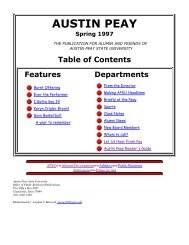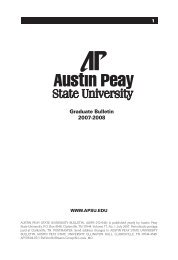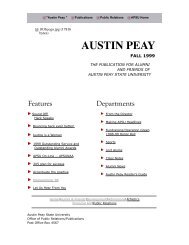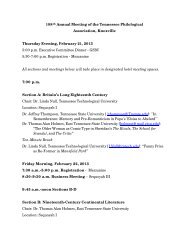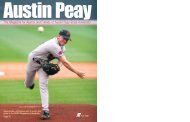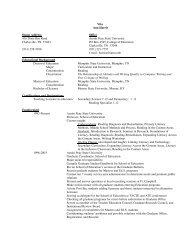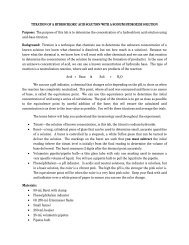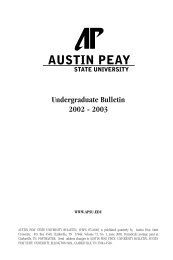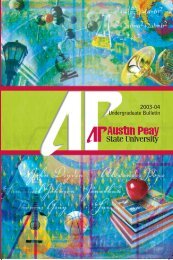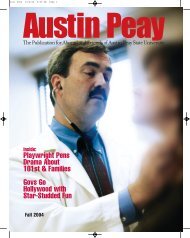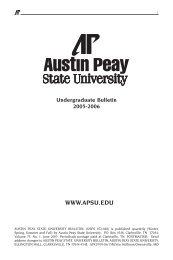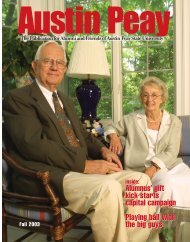Leaving on a High Note - Austin Peay State University
Leaving on a High Note - Austin Peay State University
Leaving on a High Note - Austin Peay State University
You also want an ePaper? Increase the reach of your titles
YUMPU automatically turns print PDFs into web optimized ePapers that Google loves.
APSU Sports Informati<strong>on</strong><br />
Tim Fox winds up to deliver his famous fastball—<br />
<strong>on</strong>e of the pitches he used to help the Govs<br />
advance to the 1989 Ohio Valley C<strong>on</strong>ference<br />
Champi<strong>on</strong>ship game.<br />
Preventi<strong>on</strong> and the American Cancer Society,<br />
Emory sprawls al<strong>on</strong>g what’s called the Clift<strong>on</strong><br />
Corridor, an area increasingly reminiscent of<br />
North Carolina’s famed Research Triangle Park.<br />
For Emory, growth is a fr<strong>on</strong>t-burner issue.<br />
The board of trustees has authorized preparati<strong>on</strong><br />
of schematics for a new hospital and outpatient<br />
facilities—the anchor of a plan for a new $1.2<br />
billi<strong>on</strong> health sciences complex, designed to set<br />
the standard for teaching hospitals.<br />
Emory is a good fit for Fox, who gives his<br />
best as part of a winning team. “Tim was<br />
never satisfied and c<strong>on</strong>tinued day in and day<br />
out to work hard to improve his game,” says<br />
his former APSU baseball coach Gary<br />
McClure. “Some guys are quick to point the<br />
finger or make an excuse, but Tim was a hard<br />
worker who c<strong>on</strong>tinued to prepare himself.<br />
“He’s a great team guy, an encourager …<br />
always in the game, mentally, whether it was<br />
his day to pitch or not. That al<strong>on</strong>e will make<br />
your teammates respect you.”<br />
As McClure puts it, “with all the chips <strong>on</strong><br />
the line,” Fox stepped up in the champi<strong>on</strong>ship<br />
game of the 1990 Ohio Valley C<strong>on</strong>ference<br />
Tournament and pitched<br />
the best game of his<br />
career. “Guys like Tim<br />
seem to resp<strong>on</strong>d when<br />
they’re in the toughest situati<strong>on</strong>s,”<br />
McClure says.<br />
Fox’s stellar performance<br />
in class and <strong>on</strong> the<br />
field garnered him the<br />
1990 OVC Scholar-<br />
Athlete Award—recogniti<strong>on</strong><br />
that called his academic<br />
acumen to the<br />
attenti<strong>on</strong> of his baseball<br />
buddies and, c<strong>on</strong>versely,<br />
his physics and computer<br />
science classmates<br />
became aware of his athletic<br />
abilities. Although<br />
surprised, both groups<br />
realized Fox had raised<br />
the bar in both arenas.<br />
Today, just as he was<br />
with his baseball team,<br />
Fox is an encourager to<br />
his research team, the<br />
medical residents he<br />
teaches and patients<br />
whose treatment protocols<br />
rest in his hands.<br />
Making the right call<br />
Some might say Fox’s ending up at Emory,<br />
a private university affiliated with the<br />
Methodist church, was providential. After all,<br />
his father not <strong>on</strong>ly attended graduate school at<br />
Emory, but he’s now the world director of<br />
evangelism for the World Methodist Council.<br />
Both of Fox’s parents, Dr. and Mrs. H.<br />
Eddie Fox, Nashville, always set a high premium<br />
<strong>on</strong> educati<strong>on</strong>. His father holds a Master<br />
of Divinity from Emory <strong>University</strong> and a<br />
Doctorate of Ministry from Vanderbilt<br />
<strong>University</strong>, and his mother received a bachelor’s<br />
degree in business educati<strong>on</strong> from East<br />
Tennessee <strong>State</strong> <strong>University</strong>.<br />
The parents’ modeling took root in their<br />
children. After his APSU graduati<strong>on</strong>, Fox<br />
earned a Master of Science in Radiological<br />
Engineering/Health Physics and a Ph.D. in<br />
Nuclear Engineering, both from the Georgia<br />
Institute of Technology. His twin brother,<br />
Tom, who played baseball for Birmingham<br />
Southern College, is a Nashville banker. Their<br />
sister, Gaye Nell, who received her bachelor’s<br />
and law degrees from Emory, is a practicing<br />
attorney in California.<br />
Because of his father’s ministerial work,<br />
the family settled in Nashville when Fox was<br />
6. His passi<strong>on</strong> for computers flourished at<br />
McGavock <strong>High</strong> School, where he learned<br />
four computer languages—COBOL, RPG,<br />
Fortran and BASIC—while using an IBM<br />
System 3 mainframe.<br />
Unlike most teens, he never liked playing<br />
computer games. For him, the fun was in<br />
writing and debugging the programs—a harbinger<br />
of things to come.<br />
Fox came to APSU <strong>on</strong> both a baseball and<br />
a Presidential Scholarship. Although he<br />
planned to major in computer science, he fell<br />
in love with physics, thanks to the late Dr.<br />
Robert Sears, professor of physics. Sears<br />
passed <strong>on</strong> his love for physics to Fox and his<br />
friend, Dr. Jaime Taylor, now professor of<br />
physics and chair of the APSU Department of<br />
Physics and Astr<strong>on</strong>omy.<br />
In upper-divisi<strong>on</strong> classes, Fox and Taylor<br />
were Sears’ <strong>on</strong>ly students. Fox says, “Dr.<br />
Sears met with us three hours a week, made<br />
up our exams just like a regular class. It was a<br />
lot of work for two students, but it dem<strong>on</strong>strated<br />
Dr. Sears’ dedicati<strong>on</strong> and care.”<br />
Sears refused to allow Fox to drop physics<br />
as a major. One day Fox told Sears he was<br />
going to have to quit physics because of baseball.<br />
“Dr. Sears told me, ‘No. I want you to<br />
be a physics major,’” Fox says. “So I showed<br />
him my baseball schedule. He had no idea we<br />
not <strong>on</strong>ly practiced every day, but also played<br />
50 games a seas<strong>on</strong>.”<br />
After that revelati<strong>on</strong>, Sears gave Fox a key<br />
to the physics lab so he could work <strong>on</strong> weekends<br />
and at night after games. Often Fox<br />
would get back from an away game at midnight<br />
and head to the lab where he might<br />
work into the wee hours.<br />
Fox managed and maximized his time,<br />
becoming a master at multitasking, l<strong>on</strong>g<br />
before that word entered the vernacular. He<br />
was focused, hard working, committed—just<br />
as he is today.<br />
Swing, batter, batter<br />
According to McClure, Fox’s best two<br />
pitches were his fastball and curve ball.<br />
“He threw a fastball with good velocity and<br />
good movement, which in a lot of cases is<br />
more important than velocity,” McClure says.<br />
“His curve ball was a 12-6 breaking ball—he<br />
released it at 12 o’clock and finished down<br />
through the pitch at 6 o’clock. Both pitches<br />
were very effective for him, especially when<br />
he had both of them going.”<br />
And that’s what happened in 1990 when<br />
Fox pitched the best game of his career, firing<br />
fastballs and curve balls over the plate—<br />
exactly where he wanted them.<br />
18 <strong>Austin</strong> <strong>Peay</strong>



